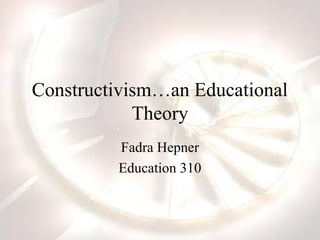
Powerpoint1.
- 1. Constructivism…an Educational Theory Fadra Hepner Education 310
- 2. Constructivism • What is it? • What does it have to tell us? • How can we apply it to our work?
- 3. During the 1930’s and 40’s, Constructivism was the leading view of Public school educators in the U.S. • Nothing terribly new about it! • Many basic beliefs stated by Dewey among others • Comprised primarily of the research by: Jean Piaget Lev Vigotsky But first…... Jerome Bruner
- 4. Constructivism..What is it? • An educational theory • Based on the idea that that places emphasis All knowledge is on the learner CONSTRUCTED • Teacher’s role: Act as based on previous a facilitator experiences
- 5. But what does this mean? • In order to understand something, we MUST be able to relate it to something else • If at all possible, APPLY this knowledge during the lesson to foster concrete connections • Differs from traditional view; the mind is a blank tablet
- 6. Instead, Constructivism views knowledge as “assimilated” into existing schema • Idea largely based on Swiss Biologist Jean Piaget’s research on child development & learning • Piaget’s theory states that children learn by creating “mental maps” or schemes • These maps or schemes are added to and adapted as needed to help them understand their environment • Structure becomes more complex as child develops
- 7. 4 Developmental stages according to Piaget • 1. Sensory motor stage (birth-2 yrs) -through physical interaction with environment, child develops set of concepts about reality & how it works -stage where child is unaware that if an object is not seen it still exists (object permanence)
- 8. 2. Preoperational stage (2-7) • Child needs concrete physical situations and is unable to conceptualize in the abstract -needs to see, hear, feel in order to understand something
- 9. 3. Concrete operations (7-11) • Child begins to conceptualize based on physical experiences -creates logical structures to explain his/her environment -abstract problem solving possible Example: math with #’s, not objects
- 10. 4. Formal operations (12+) • Cognitive structures are like an adult and include conceptual reasoning -Piaget classified as a “cognitive constructivist” focusing on processes of the mind and its effects on learning
- 11. Lev Vigotsky • Russian psychologist & philosopher in 1930’s usually associated with Social Constructivism • Social Constructivism emphasized the effects of one’s environment (family, friends, culture & background) have on learning • Today, Co-Constructivism Seems to prevail, incorporating Cognitive and Social aspects
- 12. Modern Constructivism!!! • Jerome Bruner most recent contributor • 1966-1990 Has incorporated social and cognitive aspects • These ideas originated from a conference for math and science learning Jerome Bruner
- 13. 3 Principles of Constructivism: • Instruction must be concerned with experiences and contexts that make students willing & able to learn (readiness) • Must be structured so it is easily grasped (spiral organization) • Should be designed to facilitate extrapolation or “fill in the gaps” (going beyond information given)
- 14. During the math and science conference, a modified lesson plan was developed with Bruner’s assistance The five E’s: • Engage- do this! Engage the students and get them interested in learning Ex: ask a question, define a problem, surprise them, use problematic situations TWO VOLUNTEERS PLEASE!
- 15. Explore • Get the students directly involved in the material • Have them work in teams • Act as a facilitator • Use their inquiry to drive the process
- 16. Explain • Explanations come from: -Students working together -Teacher introducing concepts and vocabulary for experiences Example: magnets-attracting force • This is also the time for the teacher to determine levels of understanding and clarify misconceptions • Drawing, writing and video are great tools to help the teacher assess development and growth
- 17. Elaborate • Students expand on concepts learned • Make connections • Apply understandings to own environment & world around them • These connections lead to further inquiry & new understandings
- 18. Evaluate • On-going diagnostic process • Can occur at all points of the instructional process -Examples: rubrics, teacher observation, student interviews, portfolios, project & problem based learning products, etc. • Used to guide teacher in further planning of lessons • May also be utilized by the students; Ex: Feedback Fridays
- 19. To summarize: • Learning is active • Engage the students on their own cognitive level • Make it interesting! • Work in groups • Act as a facilitator, not a record player • Make learning cyclical. They should have more questions when the lesson is over!
- 20. Bibliography!!!!! • http://www.miamisci.org/ph/lpintro5e.html • http://www.funderstanding.com/piaget.cfm • http://web.psych.ualberta.ca/~mike/Pearl_Street/Dictio nary/contents/P/piaget’s_stages.html • http://pdts.uh.edu/~srmehall/theory/social.html • http://www.artsined.com/teachingarts/Pedag/Construct ivist.html
